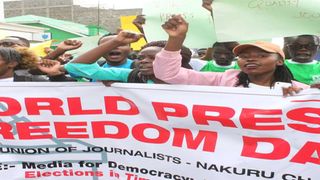
Nakuru journalists in a procession along Kenyatta Avenue in Nakuru Town to mark the World Press Freedom Day on May 3, 2019.
| John Njoroge | Nation Media GroupOur Columnists
Premium
Media rat-race is a thick thicket
I have been unplugged from the media rat race for a year. It feels like a lifetime. I’d give the season’s harvest to jump right back in; journalism is what I’m built for. When the Lord was stringing me together, he said: This is a ka-journalist. Of course, my time in the newsroom is long over but my time doing things to do with the media will never be over.
Our media has been rapidly shrinking since at least 2013 and the journalists have paid the price—always at the end of the year, or the first weeks of the New Year. Add to that a political system completely hostile to transparency and accountability.
The question is, has the media industry, which is run pretty much by the same people, learnt the important lessons of disruption and taken the necessary measures to turn around institutions and create space for professional journalism in the interest of the public and the country?
But let me start at the beginning.
What does ‘unplugging’ mean? After almost a quarter of a century of hammering away, and being hammered in return, one feels off-joint, a desperate need for solitude and recentring. Of course, I did not spend a year composing poetry, I have done some work, I couldn’t help thinking about some things, but I have ensured that my life does not have a structure or routine. I trained my brain to think about totally different things, new challenges, re-forge my identity. I’m recentred, healed.
I’m looking at the media with new eyes. I’m astounded at how little things have changed. I reviewed the papers on Wednesday morning for the first time since last year and, while they are fine, there is no revolutionary departure, no new moats and thick walls built around endangered assets.
I see the old contradiction—’Serve the audience or fight for corporate survival’—has been emphatically determined: Let’s live to fight another day. Unfortunately, in this fight, living today guarantees mortality in the near future.
I see TV still holding the Maginot line but with one certain outcome: It will not hold—unless a miracle happens to costs, the medium breaks its addiction to appointment consumption and those good folks find a slew of new and innovative means of making a lot of money, quickly.
Radio is the miracle medium, the one to save them all. But like older audiences, few pay attention to it. It is more fashionable to do a Tower of Babel made up exclusively of Ethiopian eunuchs, all chewing nails about digitisation without a firm grasp of what they are on about.
Communal glues
If a Ceska was put to my head and I was asked to name the most valuable old-media brands in Kenya—the ones likely to have a long-term future—my list would likely include The Weekly Review, Business Daily, People Daily and big community radio stations like Kameme FM; old brands which have powerful meaning for a passionate audience, brands that are tools for work or business and brands that are communal glues.
No person under 30 will ever learn to consume print in any variant—and here I mean replica editions and soft copy distributed on messaging services—with the same consistency as the older demographics. That is 75 per cent of the market gone. For this end of the population pyramid, the task is resolved, the disruption is over. This is 100 per cent digital territory.
I don’t know why people fight me when I say that the best that has ever happened to the media in Kenya is geezers in windowpane glasses. There is a fashionable, uncritical and ultimately damaging ageism in media market analysis. Yes, digitisation is a clear and present imperative. But how are you going to pay for it, and sustain it for a minimum seven years, if you can’t pay salaries?
For the over-50s, The Weekly Review is what I call affirmation consumption; ‘it’s read only by smart people like me’ kind of reasoning. The brand is encoded in the DNA of the geezer. Old, powerful wealthy people still call me when they can’t get. It is pure gold. The People’s tradition of journalism is that of the John Kamau and Mwenda Njoka generation—incredibly investigative, bold journalism, the best of our youth. The community radios are a friend, sitting around the stools in the thingira, catching up, cracking jokes.
And 25 per cent of 50 million is still 25 million.
The teenager in my house has not touched the TV for a year; she eats in the dining room with her devices. When I tried to initiate a conversation about some media things for young people which I had been toying around with, she did not wait for me to finish—“Dad,” she said, “is it on Google? Because, if it is, what is the point?”
The TV is used by other adults largely to watch crap on YouTube.
The media rat-race is a thick thicket.
- Mr Mathiu is a media consultant at Steward-Africa and former Editor-in-Chief of Nation Media Group. [email protected].





